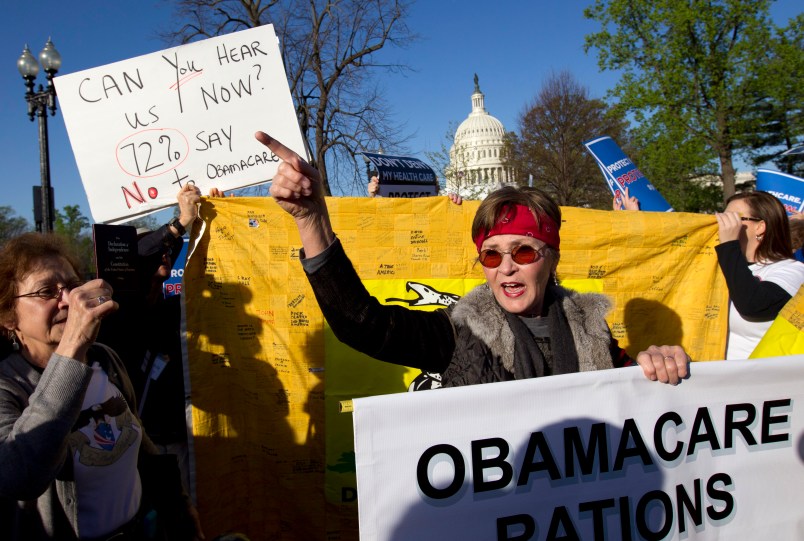There are many Democrats who believe that, in political terms, the joke will be on Republicans if the Supreme Court adopts the preposterous claim of the plaintiffs who say that Obamacare subsidies in states without state exchanges violate the law. This is because millions of middle- and lower middle-class people who had a benefit suddenly will have it taken away. I feel like I’ve been to this rodeo enough times to know Republicans have a really high capacity to stick with unpopular policies if doing otherwise would cut against key ideological priorities. In functional terms, the complaints of a few hundred thousand of what Sen. Johnson and his interviewer called “sad sacks” who lose their insurance cuts a lot less than the base’s ideological commitment to opposing Obamacare by any means necessary. But the calculus may be different in some key states – states that did not set up exchanges but are generally blue or purple in presidential elections.
I mentioned Johnson before. That’s no accident. I think Wisconsin is possibly the ground zero for this phenomenon. It’s not a slam dunk for Democrats. They have to fight for it each time. But they end up winning it pretty much every time. At least since 1984.
Here are the states without market places that seem to me in reasonable contention in 2016. As you’ll see, the list reads like a list of key swing states.
Florida (1,479,439)
Maine (66,616)
Missouri (222,559)
New Jersey (211,158)
North Carolina (512,975)
Ohio (196,714)
Pennsylvania (379,607)
Virginia (320,525)
Wisconsin (184,822)
In parantheses, I’ve listed the number of individuals in each state currently enrolled with an Obamacare policy and receiving a subsidy. These numbers are from this recent HHS report (p.52). (A big, big thanks to Charles Gaba, who runs the invaluable ACAsignups.net website. He helped me locate this document in about 60 seconds, thus saving me a ton of time and maybe even the post since I probably would have gotten frustrated and given up.)
There are a number of other states in a grey zone in which they don’t have their own full exchange but are in a partnership with the federal exchange. On top of that, there are several different flavors of partnership. How those states would be affected by an adverse SCOTUS ruling is not clear. So for the sake of this discussion, I’ve kept the list to only those states that have totally stiffed the law and left everything in the federal government’s hands. If those other states were affected (and it all depends on the Court’s decision) the list would bulge dramatically.
There’s a decent argument that Missouri is a Republican state now. And the same may apply to North Carolina. But I’ll include them for a broad measure. To put the point squarely, these are the states and the people who will be hit if the Court rules that a state needs to set up an exchange for its citizens to get subsidies.
As I said, I don’t think Texas is going to lift a finger to set up an exchange if this happens even though it will affect more than a million Texans. But I think in Wisconsin, New Jersey, Florida and other states the calculus could be very different. It could also go beyond the presidential race. That’s why I suspect Johnson is speaking up. He’s up for election, likely against Russ Feingold. This is as likely to affect congressional elections as the presidential. As you can see, the numbers of people involved are really big, and this overlap applies to most of the key swing states. If the Court rejects the whole Burwell argument, none of it matters. But if it doesn’t, I don’t think you can make sense of the 2016 election without absorbing this map.






